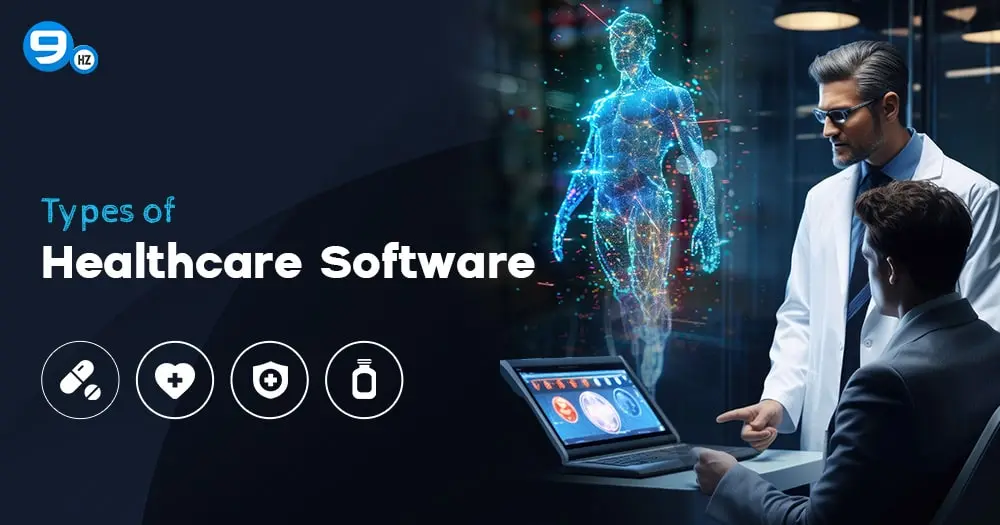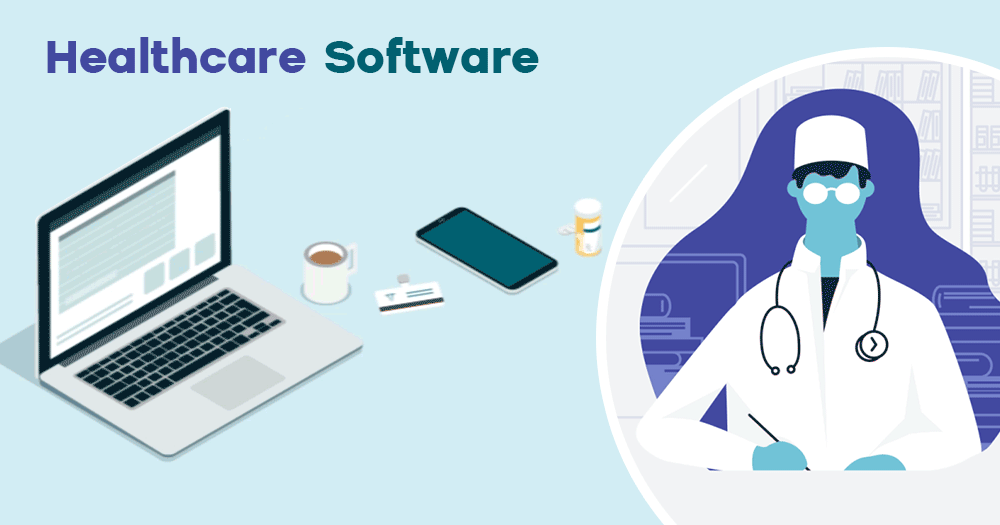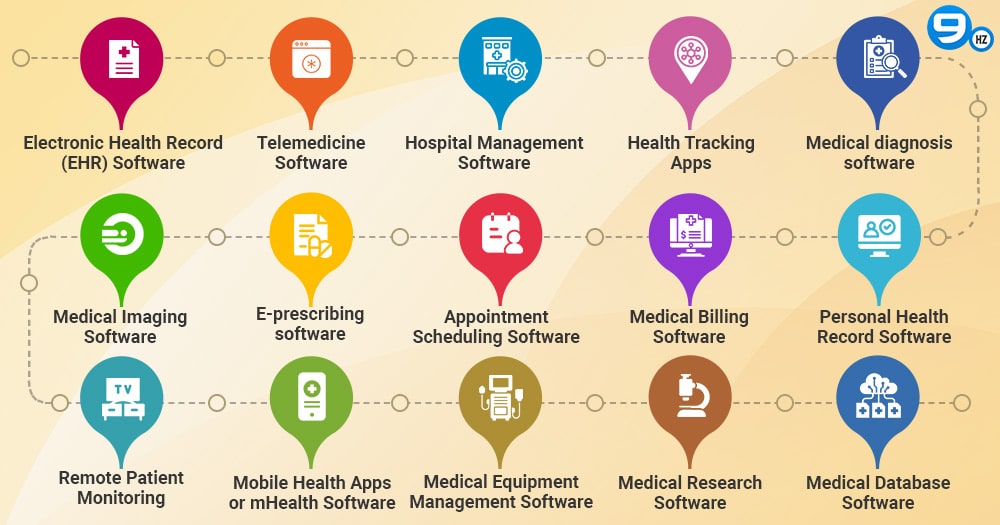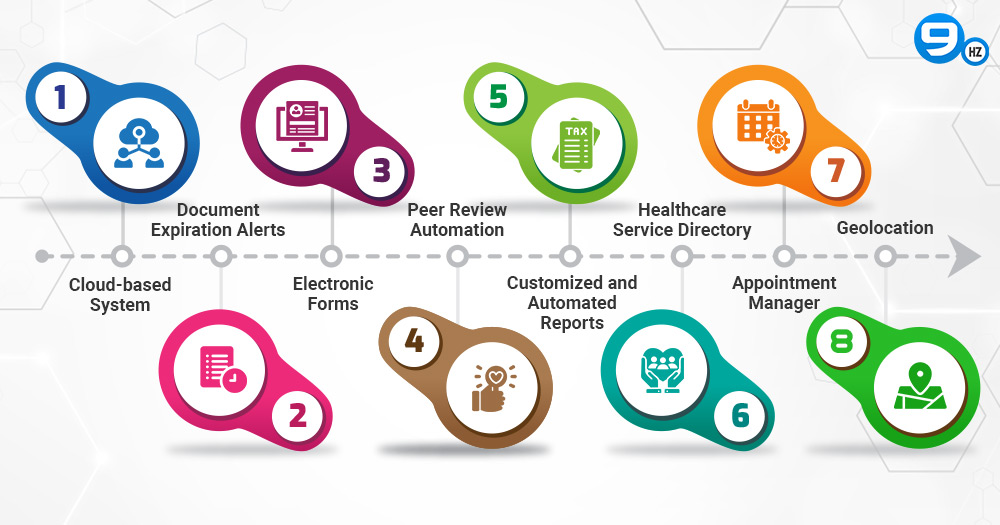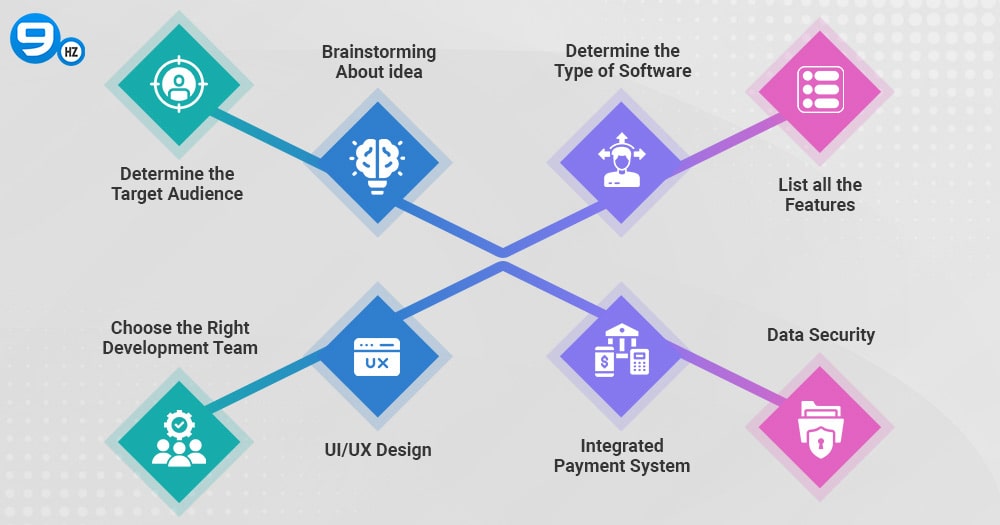With continuously increasing dependency on the healthcare systems brings a need for top-notch custom healthcare software development services that can help hospitals and other institutions to take better care of the patients. According to Acumen Research and Consulting, the global medical software market size was recorded to be $41.2 billion in 2021 which is all set to achieve a valuation of $104.1 billion by 2030.
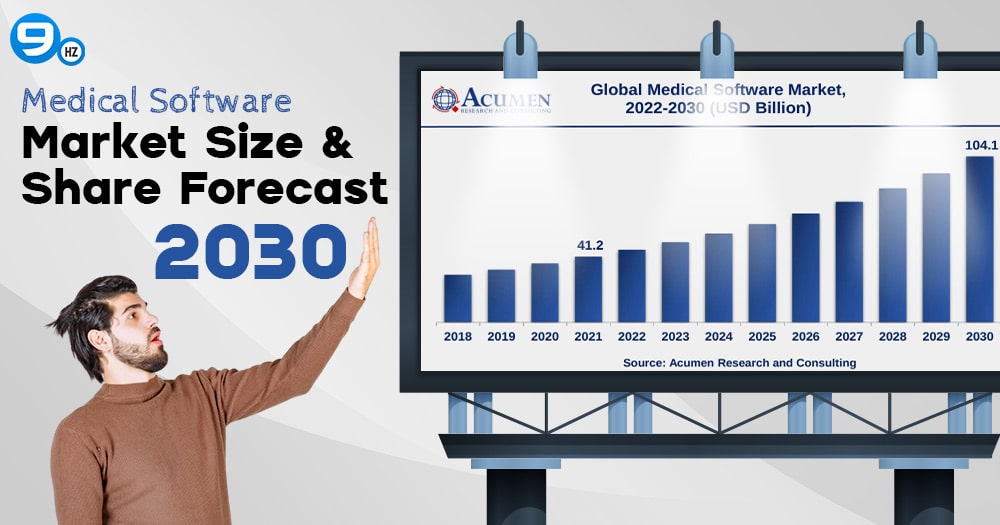
Source: Acumen Research and Consulting
However, the concern of people toward their health has constantly increased post-pandemic. So, there are a lot of health-related software that people prefer to keep installed on their smartphones that can provide insights about do’s and don’ts in our daily lives. Today, in this blog, we will talk all about different types of healthcare software and what value they add to strengthening the backbone of the healthcare system.
The Role of Software in Healthcare
While mobile apps and software have streamlined a lot of everyday tasks in different industries, healthcare is of no escape. Different types of software enable healthcare institutions to perform repetitive tasks with more efficiency, accuracy, and speed. At the same, some software fosters better connectivity between care providers and patients which is beneficial for both parties. Here are some of the benefits that people in healthcare sectors leverage because of different software.
1. First of all, software development for healthcare enhances the security factor in every process. For example, it can be ensured that the private data of patients can only be accessed via proper authentication.
2. Patients can make online appointments for their checkups and treatments so that they don’t have to wait in long queues to get treatments.
3. Patients can maintain their complete electronic health records on online platforms, eliminating the chances of lack of information and misunderstanding.
4. Be it the doctors, nurses, hospital staff, or patients, they can provide feedback about each other so that concerned authorities can take the right actions.
5. The software can help healthcare entities ensure that they have enough stock of inventories like pharmaceuticals and equipment.
6. Another benefit of healthcare software is that it minimizes the use of paperwork in the healthcare industry, encouraging more online communication.
15 of the Most Popular Types of Healthcare Software
Healthcare is a massive sector that requires different processes, formalities, and tasks to be completed in order to provide end-to-end quality medical services to patients. Here are some of the most popular different types of healthcare software.
1. Electronic Health Record (EHR) Software
This is one of the most used healthcare software which is used prominently in many small, medium, and large-sized healthcare institutions. To define it in simpler words, EHR medical software is a Customer Relationship Management tool designed specifically for the healthcare industry. EHR software consists of two sub-software which are Electronic Patient Record Software (EPR) and Electronic Medical Record (EMR) Software.
EPR is used to store and manage the patient’s data along with all the relevant information. EMR on the other hand is used to store and manage data like medication, dosage, appointments, planned procedures, and other information about the patients.
- Keeps neccessary information about the patient like past medication, injuries, operations, etc.
- Stores data like dosage, medications, appointments, etc.
- Allows patients and healthcare providers to access medical records, consultation history, and prescriptions.
2. Telemedicine Software
As the name suggests, telemedicine is one of the fastest-growing technologies that enables people to get online medical assistance from healthcare experts. According to Fortune Business Insights, the global telemedicine market was valued at $87.4 billion in 2022 which is all set to achieve a valuation of 286.2 billion by 2030 with a CAGR of 17.2%.
This software helps significantly to establish strong relationships between doctors and customers so that patients can seek better consultation, care, and health sessions from the comfort of their homes.
- Audio and video calls help doctors and patients to connect with each other.
- All the communication is HIPPA-compliant.
- Enhanced analysis and management of patient data.
- Integrated e-prescription and payment gateways.
3. Hospital Management Software
Hospitals can be of any size. Still, the workload in any of the hospitals can never compared with any other industry institution. There are a lot of tasks, procedures, and operations that have to be performed on a daily basis.
Any compromise with the quality or regularity of these tasks can have an adverse impact on the lives of patients. So, hospital management software streamlines the everyday operational activities of a hospital such as tracking patient information, processing payments, insurance details, and much more.
- Patient registration process
- Boarding, and billing information
- Emergency care module
- Space management
- Bed allocation
4. Health Tracking Apps
As the name of the software suggests, health-tracking apps are mainly used to monitor the progress of patient health over time. For the same, each patient gets a dedicated profile that tells about the overall mental, physical, and emotional health of the patient. After every treatment, the doctors update the information so that the current and past conditions can be compared and further medication can be continued.
The working principle of health tracking apps is so useful that businesses have even installed it in various wearables like bracelets, watches, bands, and more. These wearables are used widely by people to know their body movement, heart rate, sleep time, etc.
Additionally, the trend extends to pet health tracker app development, which leverages similar technology to monitor and manage the health of pets, including activities, vital signs, and overall wellness.
- Personlized profile to track health improvements
- Set goals and achieve them
- Push notification
- Social sharing
Convert Your Software idea into Reality
5. Medical Diagnosis Software
The core purpose of medical diagnosis software is to help doctors exchange all the crucial information about the patient. It ensures that doctors don’t proceed with any inaccurate diagnosis or treatment because of the information gap. At the same time, some of the advanced types of healthcare software is also equipped with artificial intelligence that even suggests diagnosis after analyzing all the symptoms and issues. Moreover, many people prefer to use such medical software to check whether they need to visit a hospital or not by telling them all the symptoms.
- Efficient exchange of patient information
- This leads to more efficient treatment
- AI-generated reliable treatments
6. Medical Imaging Software
There are mainly two major functions of medical imaging software. The first one is human anatomy 3D modeling and the second one is designing and printing equipment or body parts. The first software is used to create personalized 3D models of patients for better assessment of injury or disease. It helps a better diagnosis of the patient. The second software is used to create the elements of medical equipment or body parts like artificial limbs, or coronary stents.
- Human model for better understanding of disease
- Create a perfect artificial human body part
- Great help in cardiovascular surgery
7. E-prescribing Software
Despite having paper prescriptions that can easily be damaged, lost, misplaced, or burnt, hospitals are now switching toward e-prescribing software. This software enables doctors to share digital prescriptions about medications, precautions, and all the guidance to their patients which they can access anytime, anywhere. Moreover, the software even enables medical professionals to track, cancel, and renew prescriptions for their patients. The software is also integrated with the national drug reference databases.
- Electronic prescription for better accessibility
- Open anywhere and anytime
- Cloud-based system for better sharing
8. Appointment Scheduling Software
Booking the appointments for periodical check-ups by visiting the clinic, or hospital physically doesn’t sound to be a good idea. Most of the time, one even has to return without getting any appointment due to overcrowded hospitals. In such a situation, the appointment scheduling healthcare software is nothing less than a miracle where patients can book an appointment in a few clicks. The official email notification and automatic reminder options make sure that neither the patient nor the doctor ever misses an appointment.
- Patients can book online appointments without waiting in line
- Regular reminders ensure that both people are ready for the appointment
- Enhances the convenience for patients
9. Medical Billing Software
Among various other types of healthcare software, medical billing software has also managed to maintain a good position in the sector. This accounting software makes it very easy for the management department to keep track of each penny that comes or goes out of the account. Features like payment status, amount submitted, pending amount, date of fee collection, total income, total expenses, payment invoices, and much more make it one of the most useful solutions for healthcare entities. At the same time, this billing software can also be integrated into EHR and other healthcare software as well.
- Reduced paperwork
- Eligibility verification
- Electronic remittance
- Optimized claim tracking
10. Personal Health Record Software
Instead of just focusing on the health record of the user, this type of healthcare software keeps track of the health of all the members of the family. All health-related documents can be stored in a single application that can be accessed easily from any corner of the world. All the health data about any family member is instantly available to the doctors which helps them make better decisions and diagnoses. Moreover, the push notification feature enables healthcare institutions to send reminders about appointments and medications.
- Cloud platform for better accessibility
- Summarization modules
- Custom telehealth and telemedicine
- Data sorting and aggregation
11. Remote Patient Monitoring
Much like the telemedicine concept, remote patient monitoring works with more accurate and in-depth data about the patients. All the health-related information about the patient is collected on the software which is then examined by the health professionals available in the hospital or the online platform. This kind of technology has been of significant help during the COVID pandemic when patients were not able to get a physical bed in hospitals or clinics but urgent healthcare services were needed.
- In-depth information available about the patient
- Mobile diagnosis and treatment
- Integration with various wearables
- Enhanced comfort for patients and doctors
12. Mobile Health Apps or mHealth Software
While mHealth software was not accepted to be very reliable in the early stages, the concept has managed to achieve a prime position in the healthcare sector after the pandemic. The concern toward health has encouraged people around the world to have atleast one mHealth software on their smartphone so that they can track atleast the basic health indicators like blood pressure, heart rate, etc. Other core competencies of mobile health apps or software are but are not limited to prescription, scheduling appointments, facilitating virtual consultations, connecting to nurses and doctors, and much more.
- Mobile healthcare services
- Frequent tracking of health parameters
- Online prescription
- Online appointment scheduling
13. Medical Equipment Management Software
It is one of the most useful yet underestimated software that large hospitals and clinics must use. Medical equipment management software is basically the healthcare application that enables healthcare entities to ensure all the medicines, required equipment, and resources are in stock. It eliminates the need for manual restocking as well as also takes care of equipment maintenance. Features like automatic maintenance scheduling and inventory alerts tell the hospital management when the stock is about to exhaust and restocking is required.
- Reminders about restocking equipment
- Maintenance scheduling alerts
14. Medical Research Software
As the name suggests, medical research software has two primary purposes which are education and sharing research with people of the medical community. The sole purpose of this type of application is to train the medical personnel and share insights about different types of situations among patients and the treatment or diagnosis associated with these conditions.
- Share medical knowledge with relevant people
- Share information on diagnosis with medical personnel
Convert Your Software idea into Reality
15. Medical Database Software
Similar to those of electronic health record software, medical database software stores the treatment plans and medical history of patients. However, there is a big difference between EHR software and medical database software. EHR software stores data according to patient profiles. Medical database software, on the other hand, stores data according to the category of disease.
- Helps make better decisions for diagnosis
- Helps to know about clinical cases of a given disease
Unique Features of Software Used in the Healthcare Industry
There are various features that have to be imparted in the healthcare software which makes the application useful for the relevant stakeholders. While you might find hundreds and thousands of such software on the different app markets, there are some names you will find more popular than others. So, features are the core factor that brings the users into the fence. Here are some of the must-have features that should be integrated into the software for the healthcare industry.
1. Cloud-based System
Cloud-based systems in the software are one of the must-have features. It makes the data omnipresent and thus makes the operations more streamlined between the different departments of the hospital. At the same time, adding images and videos along with the previous diagnosis is a great way to share the neccessary information with different health personnel.
2. Document Expiration Alerts
It is important for the healthcare software to provide the document expiration alerts. Such features enable the patients and doctors to update the neccessary documents so that no stakeholder has to face any inconvenience. At the same time, it makes the process easy to renew the documents whenever they are about to expire.
3. Electronic Forms
In the healthcare sector, there are a lot of formalities that need to be done for treatment or diagnosis. Signing the documents is one of those formalities. So, electronic forms bring all the documents to the online platform and allow the patients, doctors, healthcare professionals, and management to sign the digital copies.
4. Peer Review Automation
Some of the times, consultation from one professional might not be enough. So, this feature enables the patients as well as doctors to take suggestions and consultations from other doctors and health professionals.
5. Customized and Automated Reports
This is a very useful feature for the hospital staff who have to send the regular reports manually to the people. With this feature, the software can generate automated yet customized reports on a periodical basis. These reports carry all the important information about their patients.
6. Healthcare Service Directory
This simple feature can be very useful at times. As the name suggests, many healthcare software consists of the service directory including the name, email, location, and contact number of different doctors, clinics, hospitals, specialists, and much more.
7. Appointment Manager
The appointment manager streamlines the appointment management process by allowing patients and doctors to manage all the appointments online. This feature ensures that any two appointments don’t overlap and one doesn’t have to wait long before getting the appointment.
8. Geolocation
Healthcare software is nowadays also equipped with a geolocation feature that helps patients to track pharmacies, clinics, and hospitals, and thus provides the best navigation to reach there. At the same time, the user can even find doctors and specialists according to their area of specialization.
What are Healthcare Software Development Services?
As we interpreted in the above section, healthcare software are playing a pivotal role in the healthcare industry to smooth a lot of tasks as well as foster efficiency and accuracy in the process. However, developing such an application is prone to a range of challenges. So, there are some entities called App or software development companies in USA that help you to develop full-fledged software. The services offered by such companies are called healthcare software development services.
Such healthcare app development company carry ample expertise in streamlining interactions, developing quality software, mitigating the challenges and associated risks, and delivering a fully-functioning healthcare digital solution. There are multiple methods that developers undertake in order to develop healthcare software.
The foremost one is customized software development where the development team builds an application from the very scratch. Each feature and functionality is installed in the application according to request from the client. At the same time, the design, technology stack, and everything is picked from scratch. Another method includes white-label software development where a person or the organization can take the application on lease from any vendor or company by giving it a little touch in terms of logo, theme, and design.
Factors to Consider Before Building Software for Hospitals
Developing healthcare software requires a good investment of time and money which makes it important for anyone to consider certain factors before developing software for hospitals. Here are some of the factors that will make sure that you choose the right development process for your healthcare software-
1. Determine the Target Audience
First of all, identify the audience that you want to target with your software. For the same, you can take into consideration different measurements like demographics, psychographics, and behavior. This factor will help you make better decisions regarding the software.
2. Brainstorming About Idea
Moving ahead, don’t forget to have a brainstorming session about your idea. You should know whether your software is solving a real problem or not. Also, you must ensure that your software is meant to be useful for a mass audience and not only for a small demography.
3. Determine the Type of Software
As we can understand from the section above there are different types of healthcare software. So, it is very important for you to decide on a particular healthcare software that you want to develop.
4. List all the Features
Features have a lot to do with the cost and process of custom healthcare software development. So, you must list all the features and functionalities that you want to see in the application. This practice will eliminate the chances of any misunderstanding among the developers.
5. Choose the Right Development Team
Moving ahead, ensure that you choose the right development team in terms of location, time zone, language, healthcare protection standards, and currency. It can save you a lot of time and dollars without compromising the budget.
6. UI/UX Design
Choose an intuitive user interface that can attract users and keep them engaged. Also, the navigation must be smooth and seamless so that the users can leverage all the functionalities of the application without any hindrance.
7. Integrated Payment System
The integrated payment system enables patients to make advance payments for appointments and more. At the same time, the patient can also make the full payment to hospitals, and clinics for their treatments.
8. Data Security
Data security is very crucial in healthcare software that makes sure that the personal data of the users is not being shared with third parties and never misused. Also, any interference with the health data of patients can also cause huge issues.
How Can The NineHertz Help in Building Scalable Healthcare Software Applications?
NineHertz is the leading company having experience in developing different types of software for different industries. We have been working in this niche for more than 15 years which has allowed us to explore a range of challenges along with possible mitigation strategies. We have experts who carry in-depth expertise in the healthcare industry. The NineHertz offers a free consultation session where you can discuss your idea and get valuable suggestions from our experts. This consultation session helps the stakeholders gain a better vision of their plan and the complete process to bring the vision into reality.
- 15+ years of experience
- Industry-wise expertise
- Varied solutions under one roof
- Cost efficiency
- Least time-to-market
- Ample maintenance and support
Conclusion: Types of Healthcare Software
Healthcare software redefines the way hospitals and similar entities process their daily tasks. While fostering efficiency and accuracy is one side of this software, providing better comfort and access to healthcare services are its supreme benefits. Be it electronic health record software or online diagnosis software, people are adapting to the new technology which further leads to increased demand for these software. If you are also looking to develop healthcare software, The NineHertz invites you to our free consultation session where we plan and understand all about bringing ideas to life.
FAQ’s: Develop Healthcare Software
Q.1 5 Different Types of Software Used in the Healthcare Industry?
Here are the 5 types of mostly used software in the healthcare industry-
1. Electronic Health Record Software
2. Telemedicine Software
3. Hospital Management Systems and Software
4. Appointment Scheduling Software
5. Practice Management Software.
Q.2 What is the Most Popular Software in Healthcare?
Electronic Health Record Software is the most popular software in healthcare. As the name suggests, this software fosters the online storage and tracking of all patient information along with past diagnoses and treatments.
Q.3 What Software System Do Hospitals Use?
Most hospitals use Hospital Management Software that helps them to optimize administrative tasks. Furthermore, this system enables resource management, bed allocation, staff availability, attendance, patient records, and many other tasks.
Q.4 What are the Different Types of Health Information Systems Used in Healthcare?
Here are the mostly used health information systems used in the healthcare industry-
1. Clinical Decision Support
2. Remote Patient Monitoring
3. Master Patient Index
4. Electronic Medical Record
5. Laboratory Information System.
Q.5 What are the Core Technologies Used in Most of the Healthcare Software?
The core technologies that are used for the smooth functioning of different healthcare software are but not limited to smart monitors, telehealth technology, connected ER solutions, Smart Hospital Development, Artificial Intelligence, and Machine Learning.
Great Together!
